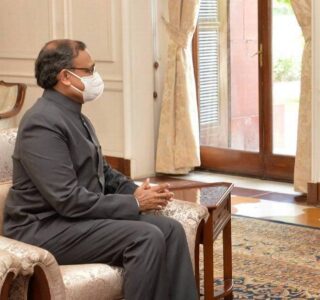
COVID-19 pandemic has not prevented some countries from supporting cross-border terrorism
The COVID-19 pandemic has not prevented some countries from supporting cross-border terrorism and spreading religious hatred, India has said at the UN, in an apparent reference to Pakistan, asserting that the United Nations must speak decisively and not take sides among religions or justify terrorism in any way.
India’s Permanent Representative to the UN, Ambassador T.S. Tirumurti, said on Tuesday that India condemns all forms of anti-semitism and all forms of discrimination on religious grounds anywhere in the world.
“We now have countries taking advantage of the ongoing pandemic and spreading divisive hatred to other parts of the world on the basis of religion. COVID has not prevented them from supporting cross-border terrorism to kill innocent people and spread religious hatred,” he said, without naming any country.
Mr. Tirumurti said India calls on those countries to stop spreading anti-semitism and hatred and stop dividing the world on the basis of religion.
“We ask them to look inwards to promote harmony within their own societies, stop sectarian violence and ensure the protection of minorities. We believe it is important for the United Nations to speak decisively and not take sides with one group of religions vis-a-vis the others or justify terrorism in any way,” he said.
Mr. Tirumurti was addressing the virtual high-level event by World Jewish Congress on combating anti-semitism.
India co-sponsored the online side event, which was held in partnership with the Permanent Mission of the Germany to the UN in collaboration with Albania, Argentina, Austria, Bosnia and Herzegovina, Canada, Cyprus, Czech Republic, Denmark, Estonia, Israel, Romania, Slovakia and Uruguay.
He said India is a country which is home to all major religions of the world and is a nation that has given birth to several religions — the most prominent of them being Hinduism, Buddhism, Sikhism and Jainism.
“I also come from a country which does not have any trace of anti-semitism,” Mr. Tirumurti said, highlighting India’s thriving Jewish community that goes back more than 2,000 years.
He said the Jewish community is an integral part of the pluralistic fabric of India, and it has enriched this fabric as much as any other community.
“In this river called Indian civilization, every faith and every denomination is embraced in the framework of our democratic structure, pluralism, harmony and mutual acceptance,” the Indian diplomat said.
Mr. Tirumurti also highlighted the numerous milestones over the period of 2,000 years of Jewish community in India — from the Jewish community being granted sanctuary by the Hindu Maharaja of Cochin Rama Varma in Kerala when it faced persecution from some European powers in the 16th century and the King of Jamnagar Maharaja Digvijaysinhji Ranjitsinhji Jadeja who in 1942 provided refuge and protection to more than 1,000 Polish children, including Jewish children when they were denied entry by other countries, bringing them up as his own.
He also spoke about the “dastardly” Mumbai terror attacks in November 2008 carried out by Pakistani terrorists.
Mr. Tirumurti said the whole of India prayed for baby Moshe Holtzberg, who was saved by his Indian caregiver, Sandra Samuel, when terrorists stormed Nariman House and killed the little baby’s father Rabbi Gavriel and mother Rivka, who was five months pregnant at the time.
He added that there are many well known Jewish-Indians who have distinguished themselves in all walks of life, including General JFR Jacob, a national hero in India who led the Eastern Command of the Indian Army during India’s victory in the 1971 Bangladesh Liberation War.
The World Jewish Congress held the high-level online event on the role of the UN in combating antisemitism as a side event to the 75th Session of the United Nations General Assembly.
“Anti-semitism poses a threat to democratic values, peace and stability, and the World Jewish Congress has long worked with the United Nations to ensure that the fight against antisemitism is a priority of the UN’s human rights agenda,” it said in a statement.
Source: The Hindu





